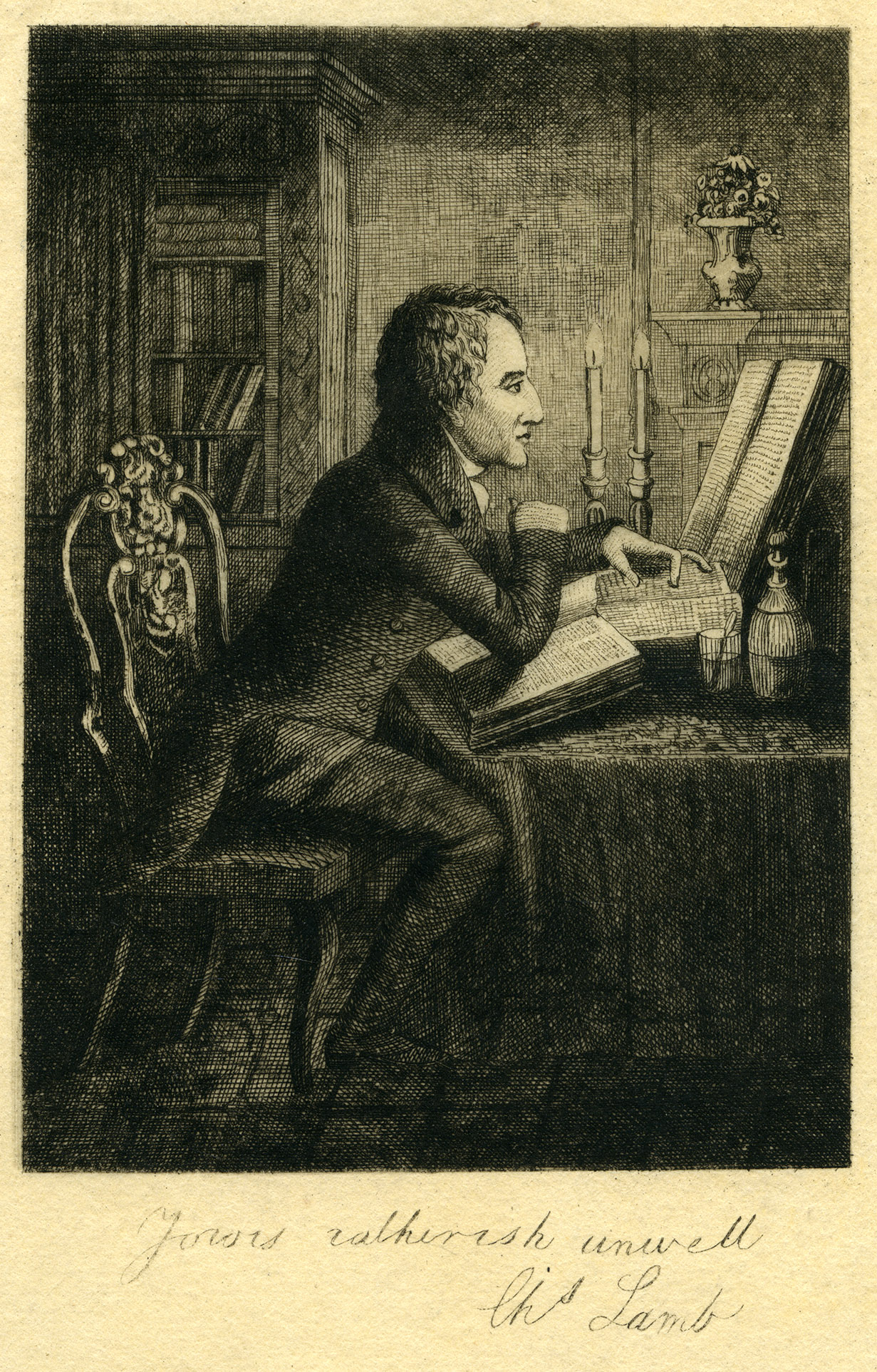Background on Charles Lamb

Charles Lamb, print after
A vivacious, eccentric, and in some ways tragic figure in literary circles in late Georgian Britain, Charles Lamb was born in London in 1775, the son of clerk to a Bencher in the Inner Temple. While a student at Christ's Hospital between 1782 and 1789, he befriended Leigh Hunt and Samuel Taylor Coleridge, developing with them a love of poetry, drama, and prose that would fuel his desire for a literary life. Considered unsuited for the ministry due to a stutter, Lamb never attended university, embarking instead on a long career in the accounting office of the British East India Company when he was just seventeen.
For Lamb, the challenge of fitting his literary ambitions into a full work life was redoubled by the impact of mental illness. Love would be the first point of departure. While on holiday in Hertfordshire In 1795, Lamb fell in love with a young woman, Ann Simmons, and proposed marriage. When she rejected him, however, he fell into such deep despair that he was remanded to a madhouse for several weeks during the winter 1795-1796. The worst was yet to come. On Sept. 22, 1796, Lamb walked into his home to discover his elder sister Mary with a butcher knife, having stabbed their mother to death and wounded their father while in a manic fit. Barely 21, Lamb rose to the occasion, rescuing Mary from permanent institutionalization by agreeing to care for her personally. For the remainder of his life, Mary was his constant companion and burden.
Despite such hardships, Lamb began to build a reputation as a writer. His name first appeared in print during the year of tragedy when four of his sonnets were included in Coleridges's compilation Poems on Various Subjects, after which he published a collaboration with Coleridge's disciple Charles Lloyd, Blank Verse (1798). Though never reaching the success he had hoped for as a poet, he developed rich connections with British Romantic writers like Robert Southey and William and Dorothy Wordsworth, with whom he remained close for many years.
At the turn of the nineteenth century, Lamb began to expand to other genres. He followed the success of his novella A Tale of Rosamund Gray (1798) with a rather less successful turn at drama with John Woodvil, a Tragedy (1802) and the spectacularly unsuccessful farce, Mr. H (1806). His fortunes improved in 1805 when William Hazlitt introduced him to William Godwin, who was planning a series of books for young readers. Collaborating with his sister Mary, Lamb produced Tales Founded on the Plays of Shakespear (1807), which became so popular that it has remained in print ever since, as well as Poetry for Children (1808) and Mrs. Leicester's School (1809). Lamb's reputation as a critic was also secured during this period through essays on the Elizabethan poets and dramatists he both admired and emulated.
As he became a fixture in the literary periodical press, Lamb fell in love for a second time, and was rebuffed for a second time. After actress Frances Maria Kelly rejected him in 1819, however, Lamb did not despair, bouncing back instead to reach the peak of his literary fame. Recruited by the London Magazine in 1820, Lamb spun out a series of essays under the pseudonym Elia, written with grace, humor, and passion on an eclectic range of topics from a dissertation upon a roast pig to a reflection on New Year's Eve. His writings were collected into Elia (1823) and The Last Essays of Elia (1833).
After taking a pension for twenty-five years' service with the East India Company, Lamb retired to the London suburbs in 1823, but the additional time to write that he had longed for did not work out as he had planned. Feeling isolated from the vibrant literary life he had enjoyed in London, he found himself increasingly weighed down and increasingly unproductive. On Dec. 29, 1833, he died of an erysipelas infection contracted after scratching himself in a minor fall in the street. At the age of 59, he died a bachelor.






